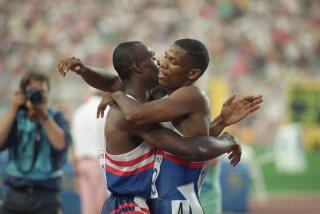Young Denies Any Doping Offense
- Share via
U.S. sprinter Jerome Young on Friday said he had never “committed a doping offense,” one day after acknowledging that he tested positive in 1999 for a banned steroid but competed at the 2000 Sydney Olympics after being cleared by U.S. track authorities.
Young carefully drew the distinction as officials with the International Olympic Committee, U.S. Olympic Committee, USA Track & Field and track’s worldwide governing body, the International Assn. of Athletics Federations, charted their next steps in what promises to be a sharp review of the case -- and of U.S. anti-doping policies.
Young, 27, of Fort Worth, tested positive on June 26, 1999, for the banned steroid nandrolone, according to interviews and documents obtained by The Times. He was initially found liable by a USATF board of a doping violation -- a ruling reversed by a USATF appeals panel, clearing Young to compete just days before the U.S. Olympic trials in July 2000.
Young ran legs in the first and semifinal rounds of the men’s 1,600-meter relay at the Sydney Games. He and five others collected gold when the U.S. team, anchored by Michael Johnson, ran to an easy victory in the final.
Without his successful appeal, Young faced the likelihood of a two-year suspension that would have kept him out of the 2000 Games.
The USATF hearing and appeal were conducted in secret, depriving the IAAF of a chance to review the case before Sydney. In nandrolone-related cases involving athletes from other nations, even those cleared by their national federations, IAAF had acted to bar competitors from the Sydney Games.
The World Anti-Doping Agency has called for the IOC to strip the U.S. relay team of its gold medals because of Young’s failed test.
“If they say, ‘Give me back your medal,’ the response won’t come from me,” said Antonio Pettigrew, who ran the second leg in the final of the 1,600 relay. “It will come from [my] law firm.”
He added with a laugh, “I want to see them tell Michael Johnson that first.”
For Pettigrew in particular, it would be poignant were the U.S. team to have to surrender its medals. The world champion in the 400 in 1991, he didn’t qualify for the U.S. Olympic team in 1992 or 1996 because of injuries or off performances. He made the U.S. team for the first time in 2000.
“I am not willing to give my medal back,” he said. “I worked hard to get my medal.”
In Sydney, Pettigrew finished seventh in the 400 meters. He then ran the second leg of the 1,600 relay in the final, taking the baton from Alvin Harrison, handing it off to Alvin’s brother, Calvin Harrison, who gave it to Johnson.
“Once the baton was given to me -- my wife was there, my mom was in Olympic Stadium -- the feeling was that I was able to help my team to win a gold medal,” Pettigrew said.
“Years and years of trying to make the team and falling short and doing this and that, I had finally accomplished something I wanted to do. After that, I could retire.”
He added, “When a dream comes true and you’re center stage and you’ve accomplished something you always wanted to achieve, you feel it that much greater.”
Young, who won the 400 meters Tuesday night at the track and field world championships in Paris, was asked Thursday about his positive 1999 test. He said, “Yes, it’s something that happened. But it’s something that I’ve ... I’ve moved on. It’s something I don’t want to talk about.”
A positive doping test marks the first step in a series of scientific, administrative and sometimes legal proceedings. The end result of the process is either the finding of a “doping offense” -- which typically leads to a suspension -- or clearance to compete.
On Friday, in a statement that was issued through USATF offices in Paris but was not put out on USATF letterhead, Young said:
“Since I won the 400 meters on Tuesday night, some journalists have asked me about the impact of recent news stories on my outlook at the world championships. I have responded to those questions by saying that the stories have happened, I’ve put them behind me and moved on. I wish to make clear that I have never committed a doping offense.”
More to Read
Go beyond the scoreboard
Get the latest on L.A.'s teams in the daily Sports Report newsletter.
You may occasionally receive promotional content from the Los Angeles Times.






